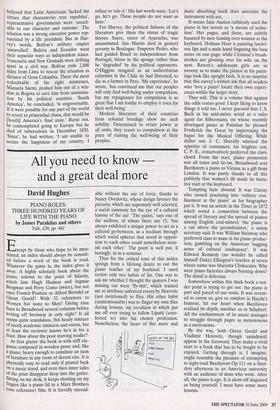All you need to know
and a great deal more
David Hughes
PIANO ROLES: THREE HUNDRED YEARS OF LIFE WITH THE PIANO by James Parakilas and others Yale, £26, pp. 461 Except by those who hope to be men- tioned, an index should always be consult- ed before a word of the book is read. Whatever the game is, the index gives it away. A highly scholarly book about the piano, solemn to the point of hilarity, which lists Hugh Hudson and Ingmar Bergman and Perry Como (twice), but not once Francis Poulenc or Alfred Brendel or Glenn Gould? With 32 references to Women but none to Men? Giving nine lines to Broadwood several columns before Writing off Steinway in only eight? It all seems quite scandalous, this heady mixture of nicely academic omission and excess, but at least the reviewer knows he's in for a feast. How about the poor starving reader? At first glance the book is with stiff ele- gance composed in wooden prose and, like a piano, heavy enough to consitute an item of furniture in any room of decent size. It is Physically easy to read only if pinned back on a music stand, and even then inner sides of the print disappear deep into the gutter. Sitting on my desk, it keeps shutting on my fingers like a piano lid in a Marx Brothers (one reference) film. It is literally unread- able without the use of force, thanks to Nancy Ovedovitz, whose design favours the pictures, which are supremely well selected, a social summary for the eye of a cultural history of the ear. 'The piano,' says one of the authors, of whom there are 15, 'has always exhibited a unique power to act as a cultural go-between, as a medium through which social spheres that stood in opposi- tion to each other could nonetheless nour- ish each other.' The point is well put, if boringly, as in a seminar.
Thus far the critical tone of this notice springs from a lifelong desire to out the piano teacher of my boyhood. I need review only two habits of his. One was to ask me whether I thought the quavers I was missing out were 'fly-shit', which trained me to attribute unforced errors by Horovitz (not mentioned) to flies. His other habit (unmentionable) was to finger my own flies during lessons, my revulsion at which put me off ever trying to follow Lipatti (unre- ferred to) into his chosen profession. Nonetheless, the heart of this more and more absorbing book does associate the instrument with sex.
It seems Jane Austen ruthlessly used the piano in her novels as 'a means of seduc- tion'. Her pages, and these, are sultrily haunted by men leaning over women at the keyboard. Holman Hunt is painting lascivi- ous lips and a male hand fingering the bass notes on one page, while Cezanne's brush- strokes are gloating over his wife on the next. Renoir's adolescent girls are so swoony as to make the pianos in his paint- ings look like upright beds. It is no surprise that this survey's writers ask that all readers who 'love a piano' locate their own experi- ences within the larger story.
They will. This is a volume that against the odds comes good. I kept liking to know things it told me. I never guessed that J. S. Bach in his mid-sixties acted as a sales agent for Silbermann, on whose recently developed piano at Potsdam he pleased Frederick the Great by improvising the fugue for the Musical Offering. While duller son J. C. liberally whetted the appetite of consumers, his brighter son, C. P. E., conservatively preferred the clavi- chord. From the start, piano promotion was all tunes and tie-ins. Broadwood sent Beethoven a piano to Vienna as a gift from London. It was partly thanks to all this publicity that women's lib made its tenta- tive start at the keyboard.
Tempting facts abound. It was Czerny who turned practising into 'solitary con- finement at the piano' as his biographer put it. It was an article in the Times in 1872 which noted a connection between the spread of literacy and the spread of pianos among English coal-miners; 'the piano is a cut above the perambulator,' a union secretary said. It was William Steinway who preferred class to mass in his piano produc- tion, gambling on the American 'nagging sense of cultural inadequacy'. It was Edward Kennedy (no wonder he called himself Duke) Ellington's teacher at seven whose name was Marietta Clinkscales. Why were piano factories always burning down? The detail is delicious.
Somewhere within this thick book a ten- der point is trying to get out: the piano is part and parcel of our souls. It was invent- ed to caress us, give us comfort in Haydn's humour, hit our heart when Beethoven realised its depth, smother us in Schubert. All the enchantment of its music manages to struggle through pages as monotonous as a metronome.
By the way, both Glenn Gould and Vladimir Horovitz, though unindexed, appear in the foreword. They make a vivid start to a book that has to be fought to be enjoyed. Getting through it, I imagine, might resemble the pleasure of attempting to sight-read Beethoven Op 111 on a thun- dery afternoon in an American university with an audience of dons who write. After all, the piano is ego. It is show-off disguised as being yourself. I must have some more lessons.
































































 Previous page
Previous page